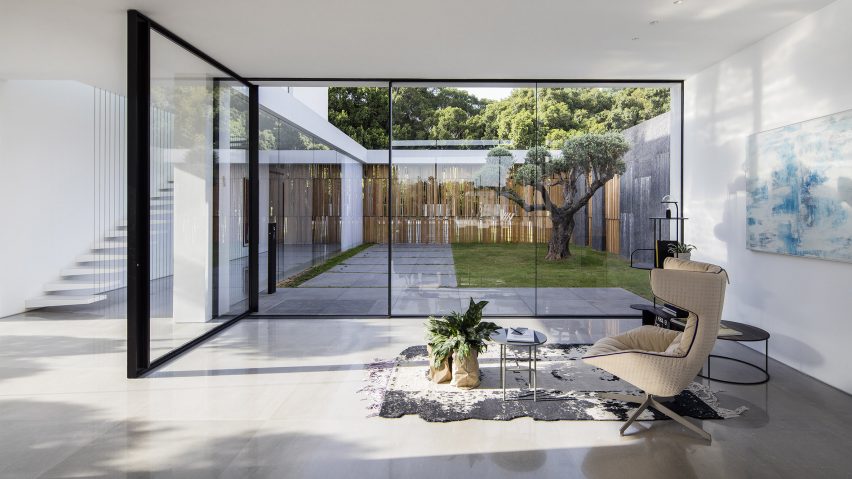Promotion: Swiss brand Vitrocsa is celebrating 30 years since the invention of its first minimal window – three decades in which it has aimed to continuously revolutionise the field by creating ever more gravity-defying designs.
Vitrocsa specialises in minimal made-to-measure windows with almost no visible frame, enabling a seamless connection between indoors and out.
The brand is a contraction of Vitres Orchidées and Constructions SA, and was founded by the Swiss engineer at Orchidées Constructions, Éric Joray after he developed a passion for growing orchids.
Joray invented the first Vitrocsa window in 1992, aiming to not only minimise the frame but also improve the glazing's waterproofing, insulation and resistance over what was being offered at the time.
The brand has continued innovating since, and now offers several systems — the Sliding, Curved, Pivoting, Guillotine and Turnable Corner windows — all of which benefit from its precision engineering approach that Vitrocsa says resembles the work of luxury watchmakers and carmakers.
"I have visited both high-end watch manufactures and racing car workshops in equal measure," said Éric Joray. "They share the same spirit, the same mentality. Time spent perfecting components that no-one will see, because they are part of a whole in which everything is of importance, every detail counts."
The intricate designs of Joray and his team have enabled Vitrocsa to create designs with mechanics completely concealed in the ground or with an impossible-seeming range of movement.
"We take great pleasure in achieving excellence," he continued. "Like the watchmakers: the thinner and more complicated the watch, the happier they are! We are driven by the same spirit."
In addition to the standard Sliding system, Vitrocsa also manufactures a Curved sliding system, with glass bent to a radius of up to 3 metres for mobile elements and 1.5 metres for fixed elements.
There is also a Pivoting system with a narrow 18-millimetre vertical profile, and the Guillotine window, which features several glass panels in either fixed or mobile configurations and which Vitrocsa describes as allowing "almost boundless heights", with a maximum weight of 500 kilograms per panel.
Some of Vitrocsa's key systems began as requests from leading architects. The Invisible Frame sliding system was initially developed for a project by French architect Jean Nouvel for which he requested "invisible frames". Its frame is entirely concealed underneath the flooring, with only grooves visible on the surface.
The newest product, 2012's Turnable Corner system, was designed for British architect Norman Foster. It uses rollers to give the panels a wide range of movement, allowing them to be turned around corners. As well as creating an impressive look, this allows aspects of space to be completely cleared of glazing.
The Open Angle sliding system is another option that frees the glazing from conventional restrictions, as it can be positioned independently from jambs.
Vitrocsa products all enable virtually uninterrupted views of the surrounding landscape and strive to embody the brand's slogan, "where indoors and outdoors become one". They are entirely manufactured in Saint-Aubin-Sauges, Switzerland.
They are available with a range of different assembly systems to suit different needs and glazing thicknesses and with the option of motorisation for movement.
There is also a variety of finish options, such as anodised 25 micron aluminium alloy or thermolacquered or anodised versions in an infinite choice of colours.
To view more about Vitrocsa, visit its website.
Partnership content
This article was written by Dezeen for Vitrocsa as part of a partnership. Find out more about Dezeen partnership content here.

